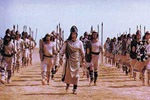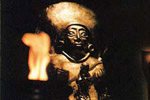| Sun | Mon | Tue | Wed | Thu | Fri | Sat |
|---|---|---|---|---|---|---|
| 1 | 2 | 3 | 4 | 5 | ||
| 6 | 7 | 8 | 9 | 10 | 11 | 12 |
| 13 | 14 | 15 | 16 | 17 | 18 | 19 |
| 20 | 21 | 22 | 23 | 24 | 25 | 26 |
| 27 | 28 | 29 | 30 | 31 |
CATEGORIES
RECENT ENTRIES
BLOG ROLL
Hittite parade
“Everybody knows about Egypt. Everybody knows about Mesopotamia,” grumbled Theo van den Hout, professor of Hittite and Anatolian languages. “But we always have to explain what Anatolia is.” The occasion of van den Hout’s lament, Thursday night’s Oriental Institute broadcast of The Hittites: The Empire that Changed the World, was also an occasion for hope: “With this movie, I don’t think we ever have to explain it again.”
After a brief introduction by director and Turkish filmmaker Tolga Ornek and a warning—“You’re going to get two hours of Hittites with no breaks”—the capacity audience learned that Anatolia (which encompassed modern-day Turkey) witnessed the rise and fall of the Hittites, who reigned from 1650 to 1180 B.C. During its zenith the Hittite empire rivaled the glory of neighboring Egypt, but now it’s “an obscure footnote on the pages of history.” As a remedy, the film reanimates the Hittites’ past, exploring their rituals, economy, laws, cities, and extensive pantheon of gods, both their own and those of conquered populations. Indeed, the documentary explains, one of the Hittites’ greatest accomplishments was to absorb and perpetuate the cultures of their Near Eastern neighbors. Even after their ultimate decline, the Hittites’ legacy included religious, military, and diplomatic innovations preserved throughout the region and the world.
The film, too, had an impact. As the lights came up one audience member mused to another, “That made me want to go study more history.”
A.L.M.
 |
 |
 |
Photos: scenes from The Hittites: The Empire that Changed the World.
November 12, 2004
